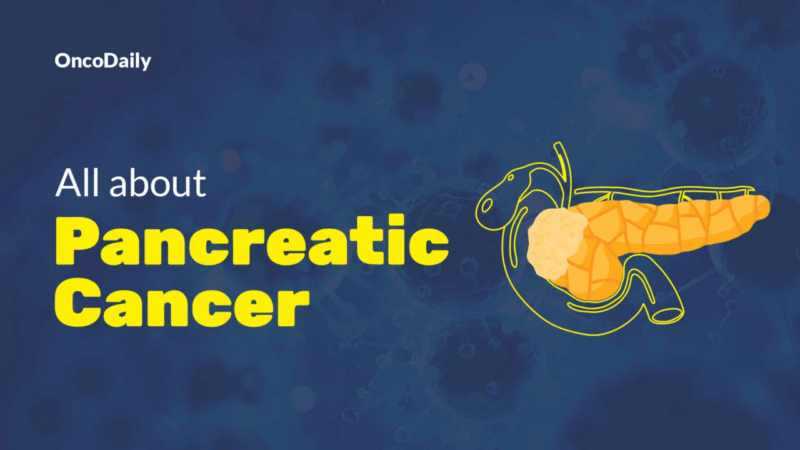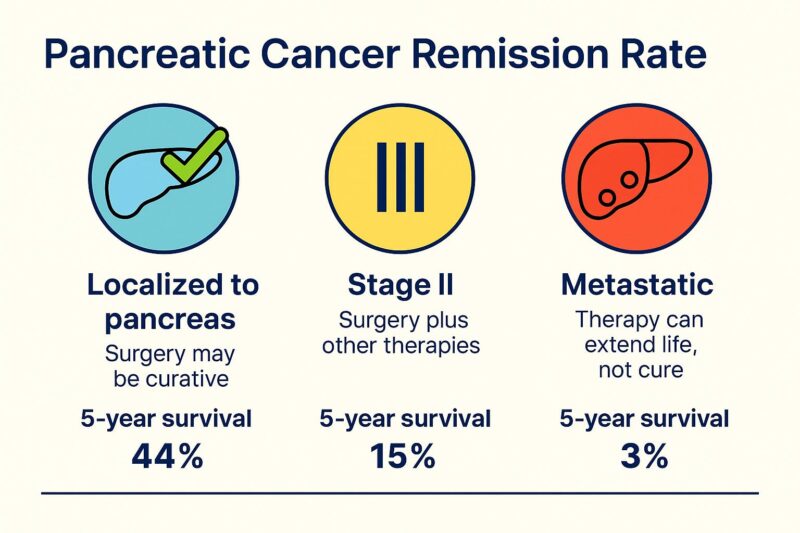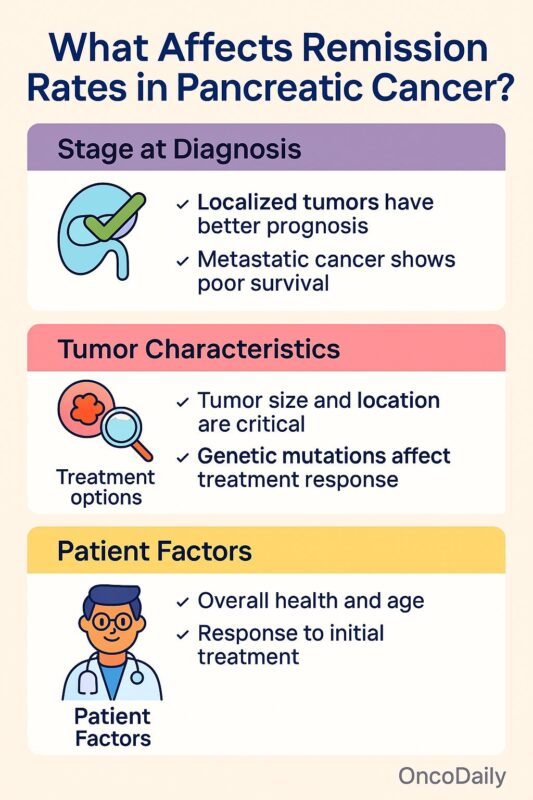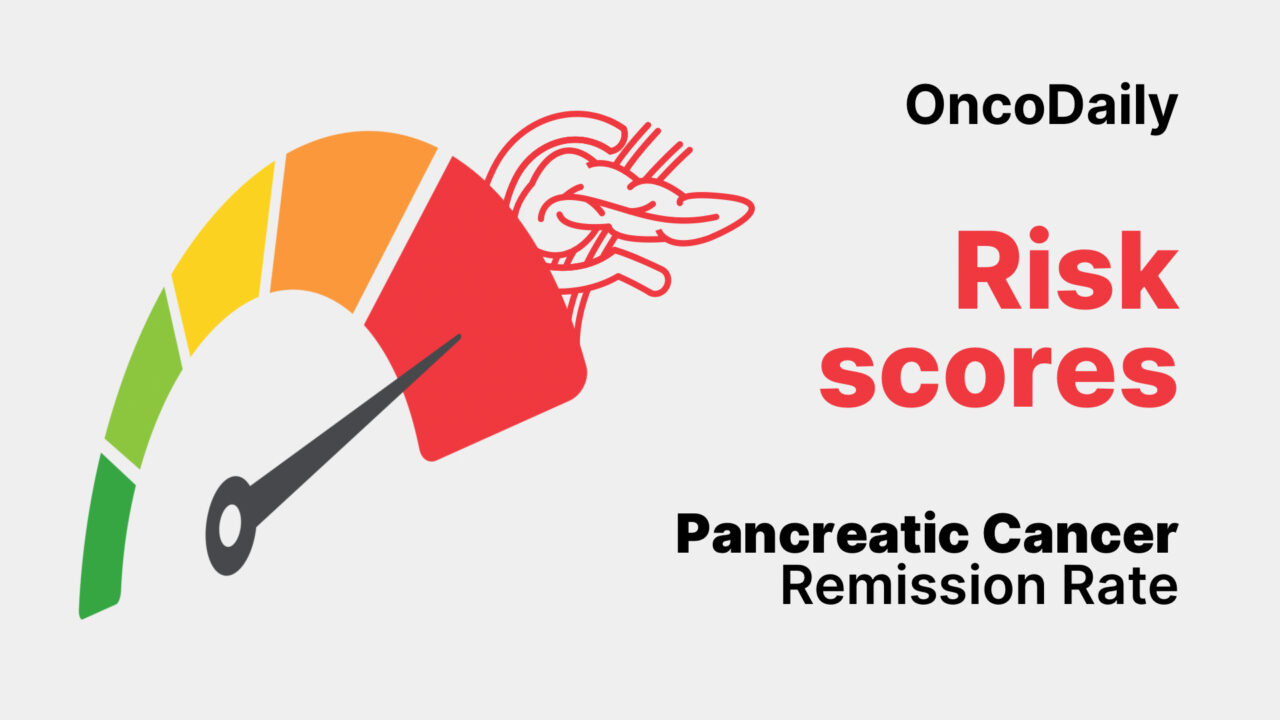Pancreatic cancer is often considered one of the most challenging malignancies in oncology, but recent advancements in detection and therapy are beginning to shift the conversation. While the term “remission” has traditionally been rare in discussions about pancreatic cancer, especially in advanced stages, the landscape is slowly evolving. Understanding the pancreatic cancer remission rate is essential for patients, families, and clinicians aiming to make informed decisions about care and hope.
According to the American Cancer Society, in 2024 approximately 66,400 people in the United States will be diagnosed with pancreatic cancer, and nearly 51,750 will die from it. This stark contrast underscores the aggressive nature of the disease, which is often diagnosed at an advanced stage due to the lack of early symptoms (Siegel et al., 2024). However, remission—particularly in early-stage cases—is not only possible but increasingly being documented in clinical practice.

Read About Pacreatic Cancer on Oncodaily
When Is Pancreatic Cancer Potentially Curable?
Curative treatment is primarily possible in patients whose cancer is detected early, while still localized and resectable. For the 10–15% of patients eligible for surgery, typically a Whipple procedure or distal pancreatectomy, the five-year survival rate can range from 20% to 37% depending on tumor size, lymph node involvement, and margins (Conroy et al., 2011; NCCN Guidelines, 2024). Some of these patients achieve long-term remission, particularly when surgery is followed by adjuvant chemotherapy such as modified FOLFIRINOX or gemcitabine-capecitabine.
Importantly, remission does not always equate to cure but rather to the absence of detectable disease following treatment. Ongoing surveillance is required because of the high risk of recurrence, especially in the first two years after surgery.

Can Advanced Pancreatic Cancer Go Into Remission?
Although traditionally seen as incurable, a small but growing number of patients with metastatic pancreatic cancer are achieving partial or even complete remission with modern systemic therapies. Combinations like FOLFIRINOX or gemcitabine plus nab-paclitaxel have shown improved overall survival and disease control compared to older regimens, with median survival reaching up to 11.1 months in pivotal trials (Conroy et al., 2011; Von Hoff et al., 2013).
In rare cases, patients on immunotherapy—particularly those with mismatch repair-deficient (dMMR) or microsatellite instability-high (MSI-H) tumors—have experienced dramatic responses, including complete remission (Le et al., 2015). However, these subtypes represent less than 1% of pancreatic cancers.
Long-term remission in advanced disease is still rare but not impossible, particularly for fit patients treated at high-volume centers with access to clinical trials and personalized therapy.
What Affects Remission Rates in Pancreatic Cancer?
Several factors influence the pancreatic cancer remission rate, including:
- Stage at diagnosis: Localized cancers have the highest likelihood of remission.
- Surgical margins: Clear (R0) margins are associated with better outcomes.
- Molecular features: BRCA-mutated tumors may respond well to platinum-based chemotherapy or PARP inhibitors.
- Treatment intensity: Patients able to tolerate aggressive chemotherapy are more likely to achieve disease control.
- Access to trials: Participation in clinical studies often provides cutting-edge options that may improve outcomes.
These variables mean that every case of pancreatic cancer is unique, and remission is determined by a constellation of clinical, biological, and systemic factors.

A Future Beyond Statistics
The five-year survival rate for all stages of pancreatic cancer remains low—about 13%—but that number has doubled over the past two decades (SEER, 2023). Novel therapies, earlier detection strategies (like liquid biopsies), and multidisciplinary care are changing the trajectory for a subset of patients.
Importantly, survivorship after remission brings its own challenges, including managing nutritional needs, long-term side effects, and emotional recovery. Continued follow-up, imaging, and tumor marker monitoring are essential to catch recurrence early.
Conclusion
Pancreatic cancer remains one of the most difficult cancers to treat, but remission is increasingly possible—especially in early-stage disease or select advanced cases receiving comprehensive care. The pancreatic cancer remission rate is slowly improving thanks to evolving treatment strategies and molecular insights. While the fight is far from over, each remission story represents a powerful reminder of the progress being made.
You Can Watch More on OncoDaily Youtube TV
Written by Armen Gevorgyan, MD


